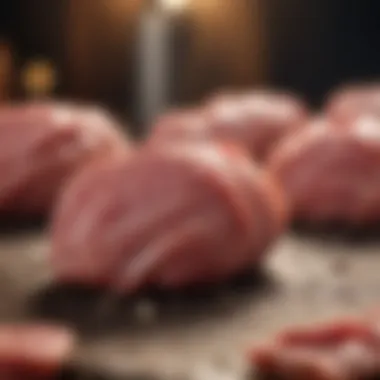Choosing the Best Raw Meat Diet for Puppies


Intro
When it comes to raising a puppy, the choices we make about their diet can feel like trying to find a needle in a haystack. The vet tells us to avoid fillers, while the neighbor swears by a raw meat diet. The world of puppy nutrition is filled with various perspectives. This discussion aims to shine a light on raw meat options for your growing companion, emphasizing what’s beneficial, what to avoid, and how to navigate this feeding method safely.
As puppies grow, they require balanced meals rich in nutrients to support their development. Raw meat, when chosen carefully, can be an excellent source of protein, but it also comes with its own set of challenges and risks. There’s a lot to consider—nutritional profiles, infection risks, and getting the right balance for your pup’s unique needs.
In the upcoming sections, we will delve deep into the plethora of raw meat options available, how they align with your furry friend’s needs, alongside insights from recent research and expert opinions. The key is not just feeding raw meat, but doing it in a way that supports health and longevity. We’ll also touch on the importance of consulting with your veterinarian throughout the process.
In short, this guide is meant to help puppy owners like you make well-informed choices without getting lost in the mire of overwhelming information. Let’s explore the raw meat landscape with a focus on what’s best for your little bundle of joy.
Understanding Raw Diets
The choice to feed puppies a raw diet is gaining traction among pet owners who look to optimize their furry companions’ health and well-being. Understanding the intricacies of raw diets forms the foundation for making informed decisions. It's not just about feeding your pup; it's about feeding them right. This encompasses knowledge of what raw diets entail, reasons behind the choice, and the nutritional value provided by raw meat.
What Are Raw Diets for Puppies?
Raw diets for puppies typically consist of uncooked meat, organs, and bones. Pet owners who advocate for this method argue that it closely mimics what dogs would consume in a more natural environment—a diet they would have thrived on before domestication altered their eating habits. The raw components are divided into different categories:
- Muscle Meat – This forms the bulk of the diet and offers essential proteins.
- Organ Meats – Liver and kidney can offer concentrated nutrients that aid in growth.
- Bones – Raw, meaty bones provide calcium and help maintain dental health.
Using raw ingredients not only brings to focus the nutritional aspects but also promotes a more enriching eating experience for a growing puppy.
Why Choose a Raw Diet?
Choosing a raw diet can often stem from a desire for higher quality nutrition. Many raw-fed puppies exhibit improvements in their vitality, coat condition, and digestion when compared to those on commercial kibble. The visual benefits can be striking, as their fur may become softer and shinier.
Here are a few reasons pet owners might lean towards raw diets:
- Allergy Management: Some puppies may develop sensitivities to fillers and additives common in traditional pet foods.
- Weight Control: Raw diets can be tailored specifically to a puppy's nutritional needs, which helps manage growth without unnecessary fillers.
- Better Digestion: Raw diets can often lead to smaller, firmer stools, indicating better nutrient absorption.
However, it’s critical to look at this alteration holistically. Not every puppy will respond favorably, and some may require gradual adjustments or could have specific dietary needs that must be taken into account.
Nutritional Value of Raw Meat
Understanding the nutritional value of raw meat requires attention to the specific components involved. Proteins in raw meat are bioavailable and digestible, which means they are readily absorbed by a puppy’s body. This differs starkly from heavily processed alternatives, which may include fillers that provide little nourishment.
The essential nutrients found in raw meats include:
- Proteins: Crucial for growth and development.
- Fats: Provides energy and supports brain development. A balance of omega-3 and omega-6 fatty acids is particularly beneficial.
- Vitamins and Minerals: Necessary for various bodily functions, they are often more preserved in raw meat compared to processed food.
"Raw diets are not just about what’s on the plate; they are about optimizing a puppy's growth potential and overall well-being."
In light of the various elements involved in raw diets, understanding what works best for individual puppies can set the stage for a successful dietary transition. This not only involves assessing the protein sources but also keeping an eye on balance and variety to fulfill nutritional requirements.
Types of Raw Meat
When considering a raw diet for puppies, the types of raw meat play a vital role in ensuring that they receive the necessary nutrients for healthy growth. Each type of meat has its own unique nutritional profile, influencing everything from energy levels to coat shine and digestive health. Choosing the right meat can help alleviate common problems while promoting overall wellness. It's not just about filling a bowl with raw ingredients; it's about creating a balanced and nourishing diet that caters to the specific needs of your growing pup.
Beef as a Raw Meat Choice


Beef is often lauded as a strong contender in the raw meat category. Packed with protein, it provides amino acids essential for muscle development. In raw form, beef retains vital minerals such as iron and zinc, contributing to a puppy’s developing immune system. Additionally, beef is relatively easy to find and is typically well accepted by most dogs.
However, it’s crucial to source high-quality beef. Grass-fed beef, for instance, tends to be richer in omega-3 fatty acids compared to grain-fed options, adding extra benefits to your pup's diet. When introducing beef, it can be beneficial to start with smaller portions to avoid any potential digestive upset.
Chicken: A Popular Option
Chicken has become a go-to option for many pet owners, and for good reason. It's often easier on the budget and usually well-liked in terms of taste. The meat itself is rich in protein, and chicken provides essential amino acids that aid in overall growth and repair. With its high digestibility, chicken can be a great starting point when transitioning to a raw diet.
However, it's worth noting that some dogs might develop sensitivities over time, which can lead to allergies. Introducing chicken to a puppy's diet should be done gradually, monitoring for any adverse reactions.
"Chicken is an excellent source of lean protein, beneficial to a puppy's development, but keep an eye out for allergy signs."
Lamb: Nutritional Composition
Lamb is often seen as a novel protein source, particularly beneficial for those pups who may not tolerate more common meats like beef or chicken. It’s typically rich in fats and proteins, providing a calorie-dense option that can aid in the weight gain of underweight puppies. In addition, lamb contains a good level of essential fatty acids that contribute to maintaining a healthy coat and skin.
While lamb can be a robust addition to a raw diet, it’s important to check for the source as some farmed lamb may contain certain antibiotics or hormones. Always choose fresh, high-quality options to ensure safety and adherence to a nutritious regimen.
Fish: Omega-3 Benefits
Fish can be a game-changer when adding raw meat options to a puppy's diet. Renowned for its rich omega-3 fatty acid content, fish can help in reducing inflammation and promoting cognitive health. Varieties like salmon are particularly praised for their high levels of DHA and EPA, which are crucial for brain development in puppies.
On the downside, raw fish carries a greater risk of parasites, so proper sourcing and preparation are paramount. Cooked fish can be a safer alternative if sourcing raw leads to concerns. Keep portion sizes modest, as too much fish can lead to an imbalance in nutrient intake.
Game Meats: A Unique Alternative
Game meats, such as venison or bison, offer a unique twist on the traditional raw diet. These proteins are sometimes considered less likely to cause allergic reactions and often come packed with rich nutrients. Game meats are high in protein and generally lower in fat compared to their commercially farmed counterparts, making them a great choice for active or growing puppies.
However, availability can be quite variable depending on location, and sourcing quality game meat is crucial. Always consult with your vet to determine whether game meats are suitable for your specific puppy, as the richness in proteins could necessitate careful portioning.
By understanding the diverse types of raw meat available, you can better tailor your puppy's diet, meeting its unique nutritional needs while ensuring a balanced intake of proteins, fats, and vitamins. Each meat has its pluses and minuses, and the right choice will depend on factors like your puppy's health, dietary restrictions, and personal taste preferences.
Nutritional Considerations
When it comes to feeding puppies a raw meat diet, understanding nutritional considerations is paramount. Puppies, being in their growing phase, require a well-rounded diet packed with the essentials that make them thrive. Not only should their food provide energy, but it also needs to promote healthy growth and development. The following subsections will delve into specific nutrients, the need for balance, and the significance of supplementation in a raw meat diet.
Essential Nutrients for Puppies
Nutrients are the building blocks for health in puppies. Here’s a closer look at some crucial components of a puppy's diet:
Proteins
Proteins play a significant role in the growth and repair of tissues. They serve as the body’s building blocks, crucial for developing muscles, organs, and the immune system. The primary characteristic of proteins is their ability to deliver amino acids, which are vital for a puppy’s growth.
High-quality proteins, such as those obtained from meats like beef and chicken, are typically favored because they’re rich in essential amino acids. They help in building lean muscle mass, contributing to a strong and active pup.
However, too much protein might lead to growth spurts that can stress a puppy’s developing bones, hence the necessity for moderation.
Fats


Fats are not just a source of energy; they also aid in nutrient absorption and support healthy skin and coat. The noteworthy aspect of fats is that they store energy, which is particularly useful for energetic puppies needing that extra pep in their step.
Omega-3 and omega-6 fatty acids, found in fish and some raw meats, are recognized for their anti-inflammatory properties and overall health benefits. Including natural sources like salmon can provide these essential fatty acids. However, an imbalance of fats can lead to obesity, so careful balancing is important.
Vitamins and Minerals
Vitamins and minerals are crucial for a puppy’s well-being, affecting everything from bone health to immune function. They’re like the unsung heroes in a raw meat diet. Vital vitamins such as A, D, and E help maintain good vision, bolster the immune system, and ensure that bones grow strong.
Unique features of vitamins include their role in regulating various bodily functions. Minerals contribute to bone health and metabolic processes, making them equally important. However, when relying solely on raw meat, it might be necessary to ensure that the diet is supplemented to avoid deficiencies, as not all essential nutrients may be present in adequate amounts in raw meat alone.
Balancing a Raw Meat Diet
Successfully balancing a raw meat diet entails a careful selection of proteins, fats, and nutrient-dense foods. Each component has its role, and striking the right balance can significantly impact a puppy's well-being. Ensuring that each meal is varied—combining different types of meat, including organ meats, and integrating bone—can provide a holistic approach to nutrition.
Supplementing Raw Meat Diets
While raw meat provides several key nutrients, supplementation is sometimes necessary to fill in gaps that raw meat alone cannot provide. For instance, adding essential fatty acids or powdered vitamins can support overall health. Regular consultations with a vet can lead to personalized recommendations to optimize the puppy's dietary intake and health outcomes. By keeping an open line of communication with a veterinarian, pet owners can adjust the diet based on the puppy's growth and health needs, ensuring they flourish and thrive.
Safety and Health Risks
When considering a raw diet for puppies, safety and health risks are paramount. Raw meat can carry various pathogens that, if not properly handled, can pose serious health threats. Therefore, understanding these risks and knowing how to mitigate them is crucial for ensuring your puppy thrives on a raw meat diet. This section will delve into potential infection risks, proper handling and storage methods, and the signs of dietary issues to keep an eye out for.
Potential Infection Risks
Bacterial Infections
Bacterial infections are a significant concern when feeding puppies raw meat. Pathogens like Salmonella and E. coli can inhabit raw meat, presenting serious health risks not just for the dogs but also for humans in the household. A key characteristic of these bacteria is their ability to cause gastrointestinal distress, which can lead to vomiting, diarrhea, and fever in puppies.
These bacterial infections are relatively common, especially if the meat has been improperly handled or stored. As such, it becomes imperative for any puppy owner to source meat from reliable suppliers and adhere to strict hygiene practices in the kitchen. A unique feature of handling raw meat is that it demands awareness of not just the safety of the puppy but also the health of the people who handle that meat.
In terms of advantages, a raw diet can boost a puppy's immune system when the risks are well-managed. However, the disadvantages cannot be ignored: a careless approach to raw feeding can lead to serious health concerns, including potential outbreaks of bacteria in your home. Being educated about these risks ensures you can protect both your puppy and your family.
Parasites
Parasites also pose a risk when feeding raw meat to puppies. Common parasites such as Toxoplasma and Giardia can be present in raw animal tissues, leading to infections that compromise a puppy's health. A distinctive characteristic of these parasites is their ability to multiply rapidly and create a significant health burden if they invade a young dog's system.
On a positive note, being aware of these potential issues allows owners to take preventive measures. For example, buying from reputable sources that test for parasites can greatly reduce the likelihood of an infestation. Conversely, the unique feature of parasites is their persistent nature; they can be difficult to eliminate once they enter the puppy's digestive system.
The disadvantages are clear—caught early, many parasites can be treated effectively, but if ignored, they can lead to severe health complications that could require long-term veterinary interventions. Thus, recognizing the importance of parasite awareness in raw feeding is crucial.
Handling and Storage of Raw Meat
Proper handling and storage of raw meat cannot be overstated. The meat should always be kept refrigerated at temperatures below 40 degrees Fahrenheit. If you’re not using the meat within a couple of days after purchase, it’s a good practice to freeze it until it’s needed. This helps in minimizing bacterial growth. Always wash your hands thoroughly before and after handling raw meats to avoid cross-contamination.
Additionally, using separate cutting boards for raw meat and other food items can prevent bacterial spread from raw meat to your puppy's dishes. After prepping meals, be sure to thoroughly clean your prep surfaces and any utensils used.
Signs of Dietary Issues
Finally, recognizing signs of dietary issues in puppies can safeguard against the potential risks associated with handling raw meat. If your puppy exhibits symptoms such as lethargy, persistent vomiting, diarrhea, or bloating, it’s important to consult a veterinarian as these may indicate adverse reactions to the diet.


Understanding the safety and health risks involved in feeding puppies raw meat creates a necessary foundation for making informed feeding decisions. Taking the right precautions can make raw feeding a beneficial experience for both puppies and their owners.
Implementing a Raw Diet
When it comes to providing a raw diet for puppies, the implementation process plays a pivotal role. It's not just about feeding your furry friend raw meat, but also about ensuring that they receive balanced nutrition, stay healthy, and adapt to this significant dietary shift. A raw diet can offer a wealth of benefits, including better digestion and shinier coats, but it's paramount how you go about this transition. Let’s break it down into the crucial steps that will help your pup thrive.
Transitioning to Raw Meat
Transitioning your puppy to a raw meat diet isn’t as simple as tossing a steak to them and calling it a day. It requires planning and careful consideration. Young dogs, in particular, need time to adjust their digestive systems. Sudden changes can lead to intestinal upset, which no pet owner wants to face.
One recommended method is the gradual approach, where you start by mixing raw meat with their current kibble. For instance, if you are starting with ground beef, add a small portion mixed with their existing food to minimize digestive stress. Over a week or so, you can slowly increase the proportion of the raw meat while decreasing the kibble amount. By the end of two weeks, many pups are eating fully raw meals without any issues.
Remember to watch for signs of discomfort or distress, as this might indicate that your pup needs more time to adapt. Always consider their individual needs – small breeds might need an even slower transition than larger ones.
Monitoring Health and Growth
As you're implementing a raw diet, close monitoring of your puppy’s health and growth becomes imperative. Keeping a watchful eye on changes in their energy levels, coat quality, and stool consistency can provide insights into how well they are adjusting.
- Energy Levels: Increased energy could indicate your pup is absorbing nutrients more effectively. Conversely, lethargy could be a sign of dietary imbalance or insufficient caloric intake.
- Coat Quality: The benefits of a fresh, raw diet often shine through the coat. A glossier and healthier coat aligns with good nutrition, while dull or flaky fur might require attention.
- Stool Quality: Ideally, you want firm, well-formed stools. Loose stools or changes in frequency may suggest that the diet needs adjustment.
Above all, regular vet check-ups will help you track weight and overall health. Don’t hesitate to consult your veterinarian for advice tailored to your puppy's specific health needs.
Veterinary Guidance and Recommendations
Consulting a veterinarian when implementing a raw diet is probably one of the smartest moves you can make. Your vet not only helps in determining if your puppy is a candidate for a raw diet, but they also offer tailored recommendations to keep your puppy fit as a fiddle.
- Initial Assessment: A veterinarian can assess your puppy's health, evaluate any pre-existing conditions, and provide insight on the most suitable raw meat options.
- Nutritional Guidance: They can guide you in balancing the diet, suggesting appropriate protein sources, and monitoring essential nutrients like calcium and phosphorus that are important for bone development.
- Ongoing Support: Regular visits will ensure that your puppy’s growth is on track, allowing adjustments if necessary.
"A raw diet is not a one-size-fits-all approach. Tailor it to fit your puppy’s specific needs for the best outcomes."
Implementing a raw diet can be a rewarding journey, provided it’s done mindfully and with appropriate health considerations. By transitioning carefully, monitoring closely, and consulting with vet professionals, you pave the way for your puppy to enjoy the advantages of a raw meat diet.
Culmination
When it comes down to feeding puppies a raw meat diet, concluding with a thorough understanding of the topic is essential. Choosing the right type(s) of raw meat is not merely a question of preference; it has profound implications on the health and development of your growing pup. As puppies transition from dependent baby canines to strong, vibrant adults, the nutrition they receive sets the foundation for their future well-being.
The significance of this article can't be overlooked. We've highlighted several key elements, including:
- Nutritional Benefits: Each type of meat carries its own unique profile of vitamins and minerals vital for puppy growth.
- Safety Considerations: Addressing risks like bacterial infections and proper handling techniques ensures the diet is safe.
- Veterinary Insight: Consulting with your vet to tailor the raw diet specifically for your puppy’s needs allows for an informed approach.
Puppies are not just pets; they are members of the family. Making smart choices concerning their diets can pave the way for an energetic and healthy life. By using raw diets thoughtfully, pet owners can offer not just food, but also the benefit of natural nutrition.
Summary of Key Points
- Understand Raw Diets: Recognizing what raw diets mean and why they hold appeal can shape one's feeding approach.
- Variety of Meats: Beef, chicken, lamb, and fish all present disparate nutritional advantages, demanding careful selection based on your puppy's needs.
- Nutritional Balance: Puppies require a well-rounded mix of proteins, fats, vitamins, and minerals to support their rapid growth and development.
- Health Monitoring: Regular check-ups and consistent monitoring can help identify any dietary issues early on.
"A balanced diet is crucial for a puppy’s health, like a solid foundation is for a house; without it, nothing stands strong."
Final Thoughts on Raw Feeding for Puppies
Reflecting on the journey through the realms of raw feeding, it becomes clear that such diets can be immensely beneficial, yet equally complex. Prioritizing quality meats while acknowledging potential risks is paramount. Puppies thrive on nutrients that raw meat diets can offer, but this requires a conscientious effort from pet owners.
Realistically, there’s no one-size-fits-all answer. Each puppy is unique, with varying needs based on size, breed, and health conditions. Therefore, it’s wise to take a proactive approach:
- Educate Yourself: Continually seek information about the best practices.
- Stay Flexible: Be ready to adjust as your puppy grows and their nutritional needs evolve.
- Trust Your Vet: They can provide guidance tailored to your specific situation.
Ultimately, raw feeding can provide a nourishing and satisfying way to care for your puppy. Making informed decisions will invariably lead to happier, healthier pets.







